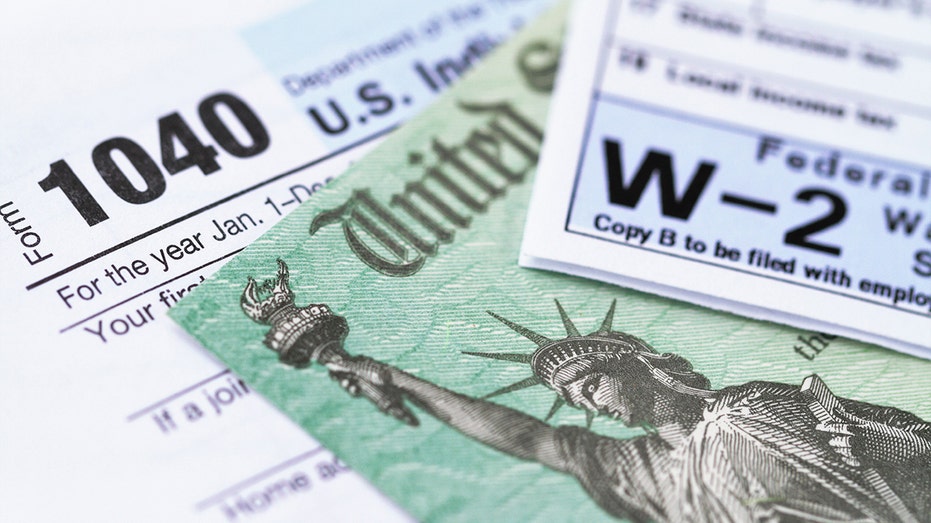A new analysis by the nonpartisan Penn Wharton Budget Model (PWBM) outlines policies that would reduce federal debt while spurring long-term economic growth, as the incoming Trump administration is due to face policy debates over taxes, spending and debt next year.
The federal government faces several key policy deadlines in 2025, starting with the debt limit suspension ending in January, which will require Congress and President-elect Trump to raise the debt limit to avoid default. Spending caps on the discretionary budget are set to expire when fiscal year 2025 ends in September, while portions of the Trump-era tax cuts are scheduled to sunset at the end of next year.
The confluence of those deadlines will leave policymakers facing a debate over how to address the massive national debt and spending growth, as well as resetting tax policies. PWBM’s policy illustration focuses on four areas — simplifying the tax code, reducing tax-induced distortions, implementing taxes to address negative externalities and reinforcing the long-term solvency of Social Security and Medicare.
“A common misunderstanding is that serious debt reduction must come at the expense of economic growth or the social safety net. We show this is incorrect,” PWBM’s analysts wrote. “The reforms herein produce sustained debt reduction, grow the economy, reduce carbon emissions, almost fully close current gaps in working-age health-care coverage, and reduce poverty among retirees.”
US NATIONAL DEBT HITS A NEW RECORD: $36 TRILLION
The tax simplification outlined in the PWBM analysis includes taxing capital gains and dividends at ordinary income tax rates, as well as taxing capital gains at death without a stepped-up basis starting in 2025.
It would expand the employment tax base to cover all pass-through income, disallow all itemized deductions except for charitable deductions, remove the income exclusion of employer-sponsored health insurance premiums from taxable income and introduce mandatory health savings accounts that can cover up to $3,000 per year in out-of-pocket health care expenses.
PWBM’s illustration would replace the standard deduction and personal exemptions with a partially refundable tax credit and lower the top income tax rate from 37% to 28% with no marginal rates above that.
It also includes a $50-per-ton carbon tax on coal, oil and natural gas products starting in 2025, which it estimates would cut greenhouse gas emissions by 7% in the short run and nearly 16% by 2054.

SOCIAL SECURITY CRISIS: BENEFICIARIES FACE 21% BENEFIT CUT WITHOUT REFORMS, SAYS CRFB
PWBM’s analysis notes that the aging of America’s population is straining the finances of Social Security and Medicare, as retirees are living longer and there are relatively fewer working-age families supporting more retirees. It suggests that the U.S. can’t rely on economic growth alone to stabilize those programs’ finances, so policy reforms are needed to achieve that.
“The United States cannot grow its way out of the shortfalls facing these two major mandatory spending programs: the spending in both programs is either explicitly or implicitly indexed for growth. Both programs materially reduce the accumulation of savings and reduce the incentive to work, which reduces growth,” PWBM said.
Among the policy changes would be raising the full-benefit Social Security retirement age from 67 to 70, a shift that would be phased in between 2037 and 2056 — so it wouldn’t affect individuals who are older than 50 in 2025. New minimum and maximum benefits would also be implemented in 2037.

ECONOMIST OFFERS BIPARTISAN PLAN TO AVOID FINANCIAL CRISIS BY STABILIZING AMERICA’S SURGING NATIONAL DEBT
The Medicare eligibility age would also be raised from 65 to 67, with the change fully phased in by 2036 under the illustration. It would also convert Medicare to a premium support system in which beneficiaries would choose from different insurance plans, with the federal government sharing the cost of premiums.
With the U.S. population projected to decline without immigration and current immigration levels insufficient to address the narrowing gap between workers and retirees, PWBM’s analysis included doubling the number of legal immigrants per year and requiring all immigrants to obtain unsubsidized health insurance.
Overall, PWBM found that the policies included in the analysis would boost GDP by 21% over 30 years compared to current law and raise wages by nearly 7% in that period, compared to current law.
Private health insurance premiums would fall by 27% over 30 years, relative to current law, due to the requirement that immigrants obtain private health insurance reducing moral hazard, and expanding the insurance pool with younger, healthier individuals.
The federal debt held by the public, which is currently 99% of U.S. GDP and is projected to rise to 166% of GDP by 2054, would be 37.8% lower than the projection in 2054 under the PWBM analysis.
Read the full article here











